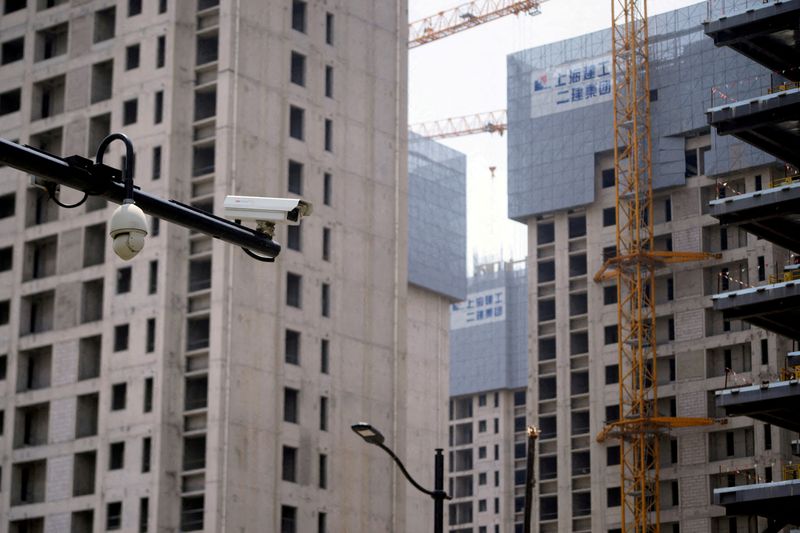Asia bond funds dump China in favour of cash after high-yield rout
2022.10.31 09:44
[ad_1]

© Reuters. FILE PHOTO: Surveillance cameras are seen near residential buildings under construction in Shanghai, China July 20, 2022. REUTERS/Aly Song
(Clarifies wording in paragraph 6)
By Summer Zhen
HONG KONG (Reuters) – Bond fund managers with strategies focused on Asian high-yield issuers have switched to cash and other non-China assets after suffering huge losses in China’s corporate bond market.
Once a sought-after investment that accounts for more than half of Asia’s high-yield corporate bond issuance, China’s property sector saw a record number of defaults in 2022 across top private developers and even some state-owned companies.
Capital outflows triggered by aggressive Federal Reserve interest rate hikes struck another blow to the already fragile segment.
Monica Hsiao, founder and chief investment officer of Triada Capital, an Asia-focused credit long-short fund, says she has not seen this kind of challenge in an investment career spanning more than 20 years.
“We hold over 50% of cash at the moment, higher than any time historically,” said Hsiao, who founded the fund in Hong Kong in 2015.
Hsiao, who managed Asia credit for London-based credit-focused asset manager CQS prior to setting up Triada, did not disclose the fund’s size and its performance.
More than two dozen Chinese property developers rated by Moody’s have defaulted since the beginning of 2021 and that has pushed the number of Asian high-yield companies rated junk to a record high.
Many holders of China high yield bonds have seen them trading below 20 cents on the dollar. The in-default bonds of property company Sunac China maturing in 2025 trade at 6 cents to a dollar.
The average return of the top 10 Asia high yield bonds is down more than 30% this year, Morningstar data shows, of which Fidelity Funds’ Asian High Yield Fund and UBS’s SICAV – Asian High Yield (USD) had shed more than 40% as of Oct. 27.
The property sector, crucial to China’s political and economic stability, has seen sharp declines in prices and sales after policymakers imposed strict curbs on borrowing by developers in mid-2020.
Hsiao said investors were hoping for policy measures to prop up real estate demand this year but that didn’t happen.
Hsiao kept reducing her fund’s China exposure from the first quarter and shifted to cash in the summer months, when the U.S. inflation threat and geopolitical risks increased.
‘UNINVESTABLE’ ASSET CLASS
Gordon Ip, chief investment officer for fixed income at asset manager Value Partners,says the fund has reduced overall exposure to China property and bought Indonesian and Indian bonds this year, mostly in energy or resources and renewables sectors.
Value Partners’ Greater China High Yield Income Fund was down 37% as of the end of September. The fund’s assets have fallen to $611 million from $980 million at the end of April.
“This has been an extraordinary year in terms of managing risks,” said Ip. “Rising rates, skyrocketing inflation, geopolitical tensions and intense sector risk (China property) have made it extremely challenging to navigate the market.”
Ip said the fund has been staying liquid by trying not to “over own” a particular issue and making sure it always has a reasonable level of cash.
Bond investors are generally sitting tight and already looking ahead to next year, said Nicholas Yap, head of Asia Flow Credit Desk Analysts at Nomura.
Investors do not see China’s property debt markets reviving anytime soon, given not just regulatory risks but also several developers’ differentiated treatment of onshore and offshore bondholders in the restructuring process.
“There is no reliable restructuring process in China that coordinates between onshore and offshore,” said Hsiao, adding she sees barely any willingness among defaulted issuers to negotiate.
While there are select bonds that have upside, China high yield as an asset class is currently “uninvestable”, she said.
“We’re right in the perfect storm. We hope for the best, but prepare for the worst,” she said.
(This story has been refiled to clarify wording in paragraph 6)
[ad_2]
Source link








